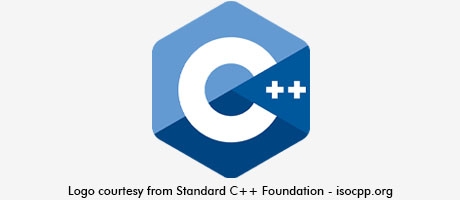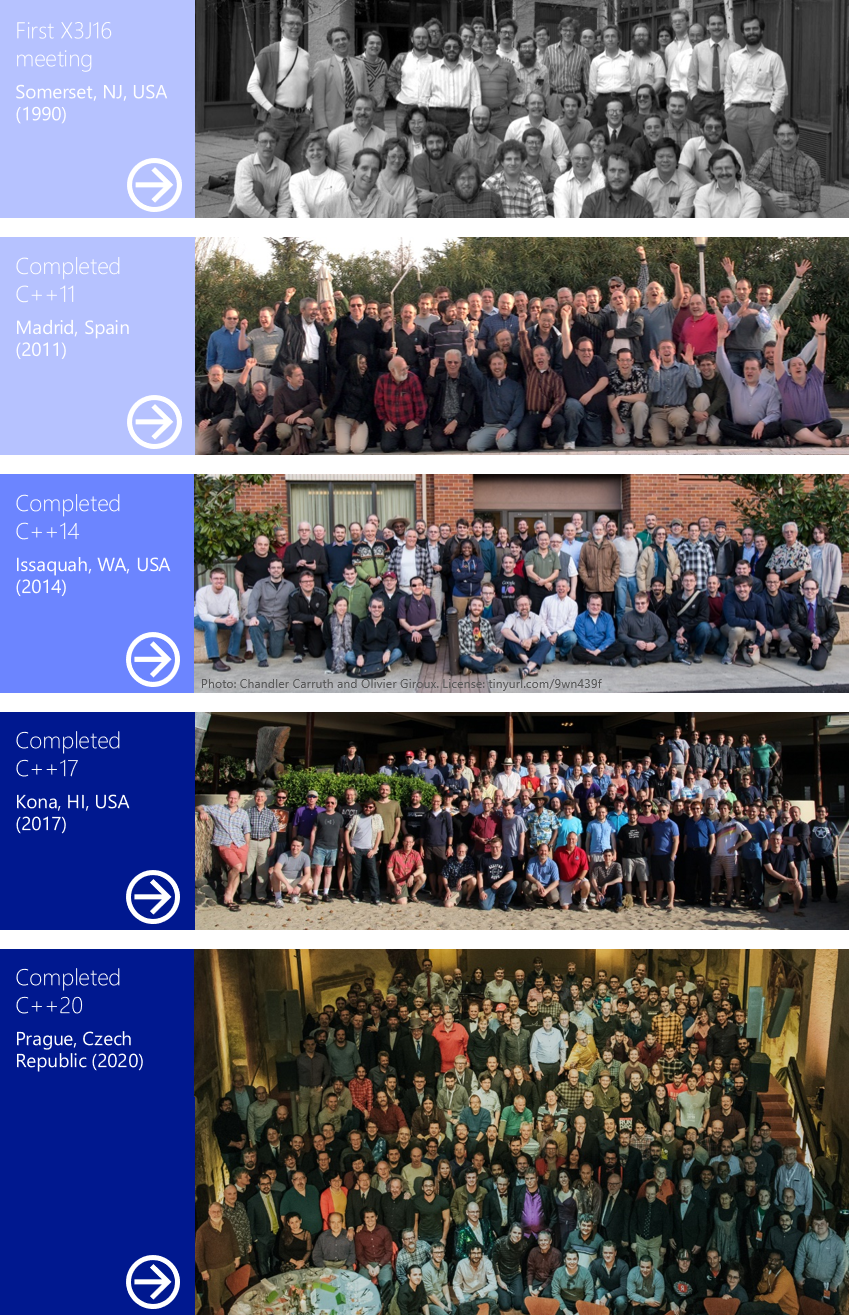using std::cpp 2020 conference program
 Will you attend?
Will you attend?
using std::cpp 2020 conference program
From the article:
The full program will be available in February 2020.
March 11-13, Online
March 16-18, Madrid, Spain
March 23-28, Croydon, London, UK
March 30, Kortrijk, Belgium
May 4-8, Aspen, CO, USA
May 4-8, Toronto, Canada
June 8 to 13, Brno, Czechia
June 17-20, Folkestone, UK
September 12-18, Aurora, CO, USA
November 6-8, Berlin, Germany
November 16-21, Búzios, Rio De Janeiro, Brazil
By Adrien Hamelin | Feb 24, 2020 02:14 PM | Tags: None
 Will you attend?
Will you attend?
using std::cpp 2020 conference program
From the article:
The full program will be available in February 2020.
By Adrien Hamelin | Feb 24, 2020 02:09 PM | Tags: c++11 basics
3 keywords that go together.
Virtual, final and override in C++
by Jonathan Boccara
From the article:
C++11 added two keywords that allow to better express your intentions with what you want to do with virtual functions: override and final. They allow to express your intentions both to fellow humans reading your code as well as to the compiler.
However, as we will see, the intention of override is super useful, but the intention of final… is harder to understand.
Both apply to virtual functions, which are the member functions of a base class that can be overridden by the classes that derive (inherit) from it...
By Blog Staff | Feb 21, 2020 11:26 AM | Tags: None
 The following are notes from Bjarne Stroustrup, regarding the completion of C++20 on Saturday and summarizing his comments to the committee in the room:
The following are notes from Bjarne Stroustrup, regarding the completion of C++20 on Saturday and summarizing his comments to the committee in the room:
After the 79-0 vote deeming C++20 done on February 15, 2020 in Prague, I made a few comments to emphasize the significance of the event. I got to the lectern just after Herb Sutter had shown photos of the C++ standards committee members at the first meeting and the meetings that voted for the C++11, C++14, C++17, and C++20 standards. I was in all of those, so was Mike Miller from EDG and chair of the Core Working Group. We were the only ones in all photos. This is roughly what I said:
This is a historical event:
- 30 years of C++ standardization.
- 40 years of C++.
- C++20 is the 6th standard, the 3rd major standard; by “major” I mean “changes the way people think.”
- This is something like the 75th meeting; I have been at about 70 of those.
I’d like to add a personal note. For me, C++20 is special because it has essentially all from “The Design and Evolution” (1994). In particular, it has concepts, modules, and coroutines:
- Concepts were not in D&E, but there were three pages of apologies for not having them. Then, neither I nor anyone else know how to design and implement them sufficiently well.
- Modules were just a dream then, but they were specifically mentioned – I dreamed of a day where we could finally eliminate the preprocessor.
- Coroutines were the bread and butter for C++ during the first 10 years; they were missing in most other languages. I was sore having lost them to implementation problems on SPARC architecture.
In addition, we get improved concurrency and a library with ranges, dates, and span.
We (the C++ standards committee members) must be careful and responsible; we serve a huge community:
- Serve the community at large, rather than just experts – “keep simple things simple.”
- Be careful, the world changes; what seems essential or fashionable today may not be good in the longer term.
- Be pragmatic, not doctrinaire; pragmatic and principled.
This has guided the development of C++ so far. No, that’s not easy. We must balance many concerns. I suggest we:
- Pursue the goal of a completely resource-safe and type-safe C++.
- Support a wide variety of hardware well.
- Maintain C++’s record of stability (compatibility) – “stability is a feature” – as much as makes sense.
These aims have served C++ well throughout.
I wonder who’ll be here in 30 years? That’ll be 2050.
Thanks for listening. See you in Varna! (Varna is the location of the next ISO C++ Standards meeting).
By Adrien Hamelin | Feb 20, 2020 01:59 PM | Tags: community
All you want to know.
Freestanding in Prague
by Ben Craig
From the article:
The C++ standards committee met in Prague, Czech Republic between Feb 10 and Feb 15. The standard is wording complete, and the only thing between here and getting it published is ISO process. As is typical for me at these meetings, I spent a lot of time doing freestanding things, Library Incubator (LEWGI) things, and minuting along the way (15-ish sessions/papers!)...
By Adrien Hamelin | Feb 20, 2020 01:56 PM | Tags: basics
No need to get complicated.
Move, simply
by Herb Sutter
From the article:
C++ “move” semantics are simple, but they are still widely misunderstood. This post is an attempt to shed light on that situation...
By Adrien Hamelin | Feb 20, 2020 01:50 PM | Tags: c++20
One big of c++20.
C++20: The Ranges Library
by Rainer Grimm
From the article:
Thanks to the ranges library in C++20, working with the Standard Template Library (STL) will become much more comfortable and powerful. The algorithms of the ranges library are lazy, can work directly on the container and can easily be composed. To make it short: The comfort and the power of the ranges library are due to its functional ideas. Let me show you what that means...
By Ansel Sermersheim | Feb 20, 2020 12:07 PM | Tags: None
New video on the CopperSpice YouTube Channel:
Moving to C++17
by Barbara Geller and Ansel Sermersheim
About the video:
In this video, we look at some of the significant improvements that were added to the language in C++17, and how they can apply to your code base. We also present some interesting questions you might want to ask, or be able to answer, in an interview for a position using C++17.
Please take a look and remember to subscribe!
By stephanakib | Feb 20, 2020 12:05 PM | Tags: None
Writing reliable and maintainable C++ software is hard. Designing such software at scale adds a new set of challenges. Creating large-scale systems requires a practical understanding of logical design — beyond the theoretical concepts addressed in most popular texts. To be successful on an enterprise scale, developers must also address physical design, a dimension of software engineering that may be unfamiliar even to expert developers. How do you do this?
Large-Scale C++ Volume I: Process and Architecture
by John Lakos
From the article:
Drawing on over 30 years of hands-on experience building massive, mission-critical enterprise systems, John Lakos lays the foundation for projects of all sizes and demonstrates the processes, methods, techniques, and tools needed for successful real-world, large-scale development.
Up to date and with a solid engineering focus, this book demonstrates fundamental design concepts with concrete examples.
This book, written for fellow software practitioners, uses familiar C++ constructs to solve real-world problems while identifying (and motivating) modern C++ alternatives.
By Adrien Hamelin | Feb 18, 2020 01:07 PM | Tags: community
Houra!
C++20 is Done!
From the article:
C++20, the most impactful revision of C++ in a decade, is done! ������
By Adrien Hamelin | Feb 18, 2020 01:03 PM | Tags: community
 ACCU’s Overload journal of February 2020 is out. It contains the following C++ related articles.
ACCU’s Overload journal of February 2020 is out. It contains the following C++ related articles.
Overload 155 is now available
From the journal:
Members and Remembrances.
Remembering things can be difficult. Frances Buontempo reminisces on routes to erudition.A line-to-line conversion from Node.js to Node.cpp.
Dmytro Ivanchykhin, Sergey Ignatchenko and Maxim Blashchuk show how we can get a 5x improvement in speed.The Path of Least Resistance.
Python’s modules and imports can be overwhelming. Steve Love attempts to de-mystify the process.Quick Modular Calculations(Part 2).
The minverse algorithm previously seen is fast but has limitations. Cassio Neri presents two alternatives.A Secure Environment for Running Apps?.
Getting apps from the app store is easy. Alan Griffiths considers this from a security perspective.Afterwood.
The centre half is more than a sporting term. Chris Oldwood shows us why.